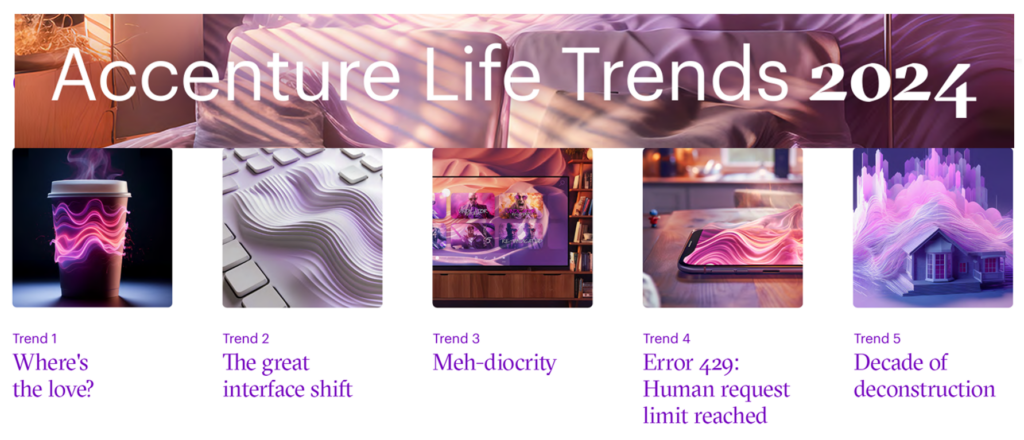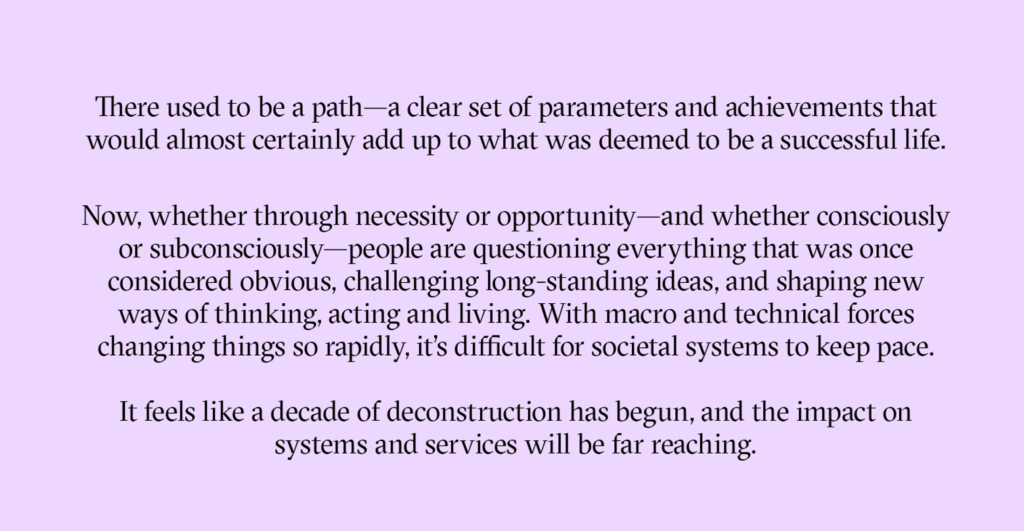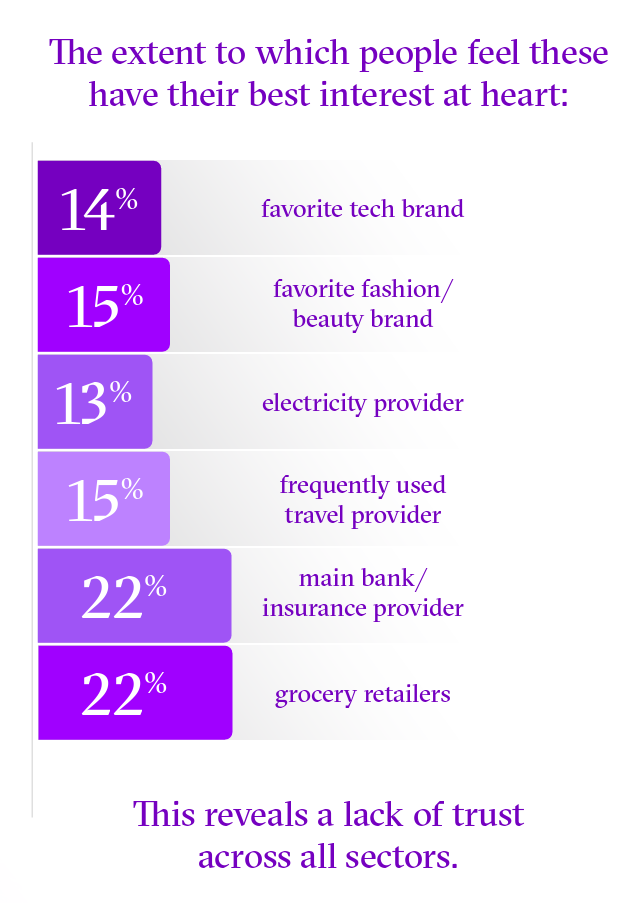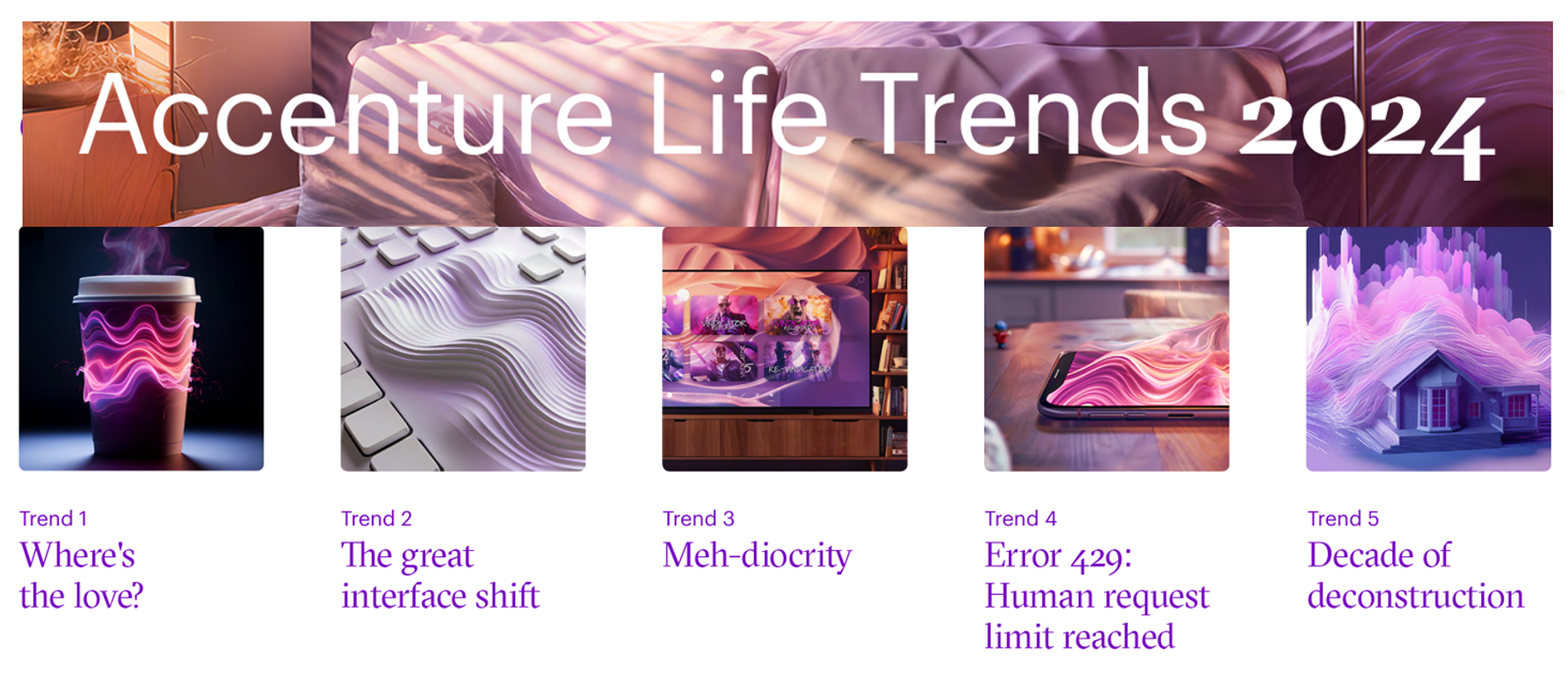In the company’s 17th annual look into consumers’ “life trends,” Accenture finds that, top-line, “The harmony between people, tech and business is showing tensions, and society is in flux.” And these consumer-facing trends will also shape peoples’ attitudes about their health care, how they access and pay for it, and what kinds of services and support health consumers will expect in this era of “deconstruction.”

Taken together, the trends noted in Accenture’s 2024 report on Life Trends finds that one-half of consumers, globally, are changing their life goals, making their jobs and retirement stability more important than getting (1) a college degree or (2) married. furthermore, one-half of folks globally are also not comfortable making plans more than 12 months ahead.

Accenture’s multi-pronged team on the study identified five key trends for us to consider when developing and marketing products, services and experiences to people, globally:
- Where’s the love? asking us to be mindful about companies’ balancing profit and financial considerations with customer needs and values — being careful not to short-change the latter in our search for short-term financial benefit. [As Nasser, a 52-year-old respondent from France wryly observed, “You notice they put less crisps in a packet which I think is robbery.”]
- The great interface shift, leveraging the new powers and skills of Gen AI to help better build relationships with customers.
- Meh-diocrity, confronting and addressing a period of potential cultural stagnation — think: movie franchise re-boots and stale brand content.
- Error 429 – Human request limit reached, assuring that technology is our partner and humanizing helpmate, not a mental health-eroder.
- Decade of deconstruction, recognizing the challenge of demographics bumping up against technology and financial constraints and stressors, and serving up opportunities — and barriers — that are re-shaping peoples’ priorities and choices.

These trends also combine to erode peoples’ trust in the industries with which they deal each day, from technology and fashion to banking, fashion, and grocery stores. Most people around the world do not believe these industries have their best interest at heart — revealing a lack of trust across all sectors, Accenture calls out.
Accenture polled 15.227 global consumers in August 2023 residing in 21 countries. The study oversampled the U.S. (with 2,000 respondents), and surveyed 1,000 consumers living in the UK, Singapore, South Africa, Australia, Canada and Japan. In addition, 500 respondents were polled from the remaining 14 nations.
Accenture Song’s global network of creatives and other experts also provided input of market signals and trends in a crowdsourcing mode, running about 10,000 text and audio statements through a Generative AI tool to further inform the research.
Health Populi’s Hot Points: Accenture tells us that “on individual and societal levels, people are rethinking the features or milestones of life and crafting different paths.” For example, the proportion of global consumers interested in marriage fell from 30% to 21% in 2023, and the percentage of people keen to move out of their parental home fell from 23% to 17%, Accenture learned. Jobs were once seen held “for life,” and one salary was sufficient for raising the “average” family.
In 2023 and in the coming decade of deconstruction, the “big moments” like marriage and college graduation will become more fragmented, diversified, and too-expensive for some consumers to opt into, based on Accenture’s expectation that some consumers will “choose to funnel their resources elsewhere.”
Health care implications of the 2024 Accenture Life Trends findings are many and impact every segment of the industry, from hospitals and health insurance to self-care, home care, fitness and well-being.
Considering Trend 5, the expected decade of deconstruction, the fragmenting of society and lower likelihood to marry, for example, will increase the phenomenon of single person households — which can translate into greater need for caregiving coming from outside of the home, to transportation needs requiring fulfillment beyond the family driver, and to growing demand for support services that can’t be delivered to a member of a household or family unit. In many countries outside of the U.S., demographics of aging and social cohesion have already moved in this direction. In France, for example, members of the national postal services have been called onto check into older householders’ well-being, addressing loneliness among older people living alone. That’s an example of one’s ZIP (or postal) code being key to one’s health – whether mental, physical, or fiscal.
Do check out Accenture’s take on the future — the health care implications of which, in this report, will extend well past the 2024 forecast. The implications for health care and peoples’ well-being are many, and the report can inspire your thinking about the opportunities — and threats ahead due to the social trends considered.

And for a hit of social health, combating the epidemic of loneliness and “meh” content, see my postscript post as a short “Exhibit A’ to complement this Accenture 2024 Life Trends discussion in today’s Health Populi, too. Amazon’s holiday ad weaves together some sweet content and music and evidence-based joy to bolster all of our social health — and that of the three girlfriends in the video.





 Thank you, Jared Johnson, for including me on the list of the
Thank you, Jared Johnson, for including me on the list of the  I am so grateful to Tom Lawry for asking me to pen the foreword for his book, Health Care Nation,
I am so grateful to Tom Lawry for asking me to pen the foreword for his book, Health Care Nation,  Thanks to Feedspot for naming this blog, Health Populi, as a
Thanks to Feedspot for naming this blog, Health Populi, as a